Author: Pete
Location: Opua, New Zealand – Santiago Chile
In the wee hours of the night, the crew of Tayrona beamed** at slightly less than the speed of light to Santiago, Chile to speak with the fifth-grade class of Casey Overton, a colleague and friend of ours teaching in the International School Nido de Aguilas. As part of a unit investigating explorers and exploration, we were invited to speak with the students to give them some contact with people currently on an expedition. Miranda and I mulled over some of the potential questions we expected, which was an interesting exercise and led to some good dialogue between the two of us. Due to connection limitations some of the details were lost in transmission and I wanted to put up our discussion here for the students and other interested parties.
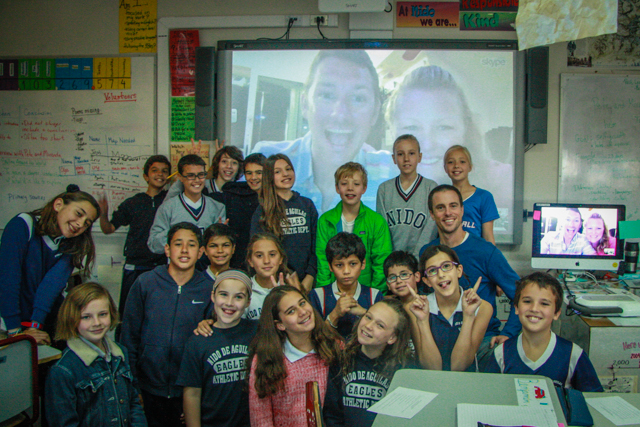
Q: What was your goal for the expedition? -Martin
The goal of the expedition was to learn to sail a self-sufficient boat long distances off shore and explore places that were difficult to get to without a boat. When we started out the expedition, the idea was to circumnavigate the globe, go all the way around it. But as we did more research and settled on a timeframe, we realized that it is possible to go all the way around in the two years we wanted to take as sabbatical, but not very fulfilling just sailing like crazy all the time. We decided to sail from Florida to Australia, half way around the world. It would give us more time for enjoying and learning about new places and cultures, and still achieve our main goal of learning to sail a blue water boat way beyond the horizon.
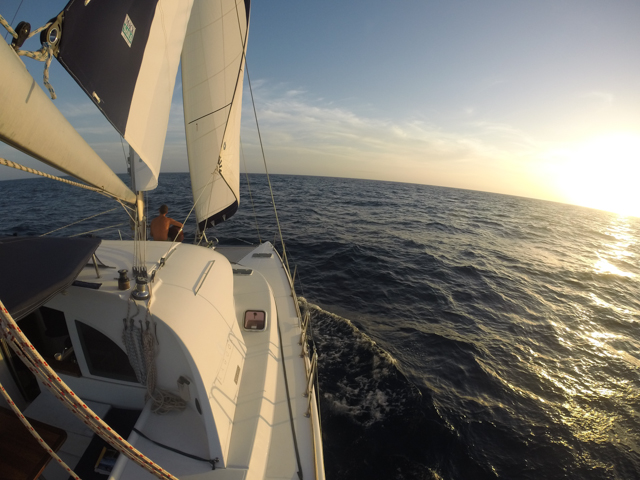
Q: What was your favorite experience so far in your time sailing? -Olga
M: Mine was definitely the feeling of accomplishment when we finished the month-long Galapagos to Marquesas passage. A month at sea is a long time, and I was really apprehensive about it. There was a looming cloud of fear over my head for quite some time before our pacific crossing. I remember the feeling of seeing French Polynesia rise out of the sea after seeing nothing but water and clouds for twenty some days, and the pride I felt for myself and my crew was like nothing I have felt before.
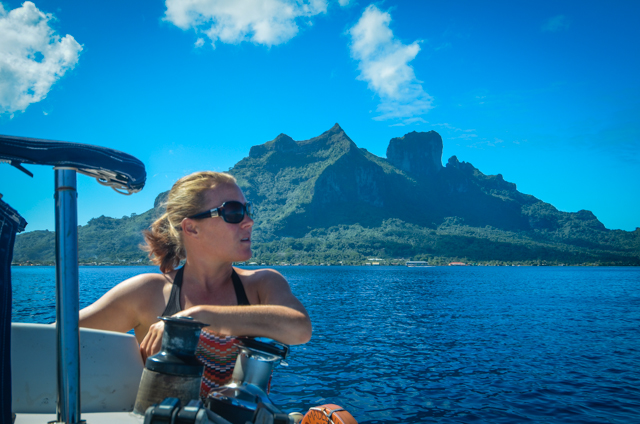
P: That was pretty fantastic. There were so many great experiences; one of mine was something that happened on a night watch on passage from Panama to the Galapagos. I was on watch alone and there was no wind, the sea was like glass and the stars were out in force with no moon. There is bioluminescent plankton in the water in some parts of the ocean. They’re tiny microscopic organisms and some of them glow in the dark when you agitate them. So you can see the twin trails of Tayrona as she cuts through the water, and the trace of fish hunting squid. So I’m sitting on deck by myself and this big, blue-green form comes swimming up to the boat, like a manta ray or a shark or something almost the size of the boat, a huge glowing form. I got nervous like it was going to ram us, but it dove under the boat and popped up on the other side, super smooth, and glowed off into the night. It was like a gift for only me from the sea. Pretty powerful memory for me.
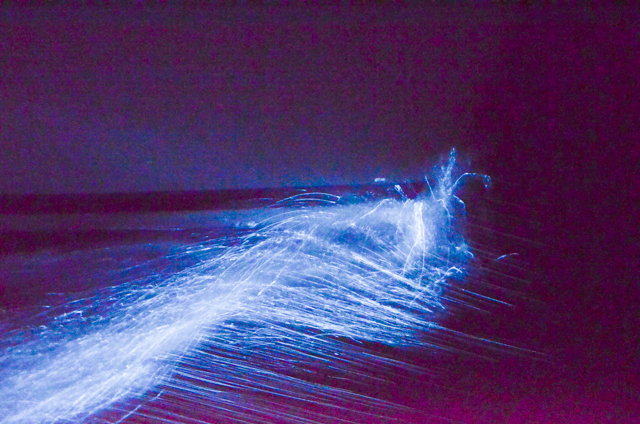
Q: What have you done outside of sailing along the way? -Rowin
M: We go hiking on land, up to waterfalls, around the islands, into little towns. We do a ton of snorkeling and identifying different marine life. We also spearfish for lobster and fish for dinner! We like to discover as much as we can about the local cultures- learning new languages, viewing different customs, and eating new weird food. There’s this great event in Tahiti where the men dress up in skirts and have a foot race carrying a huge bunch of bananas. It’s pretty hilarious to watch but they take it really seriously and you don’t want to tick off the big Polynesian guys with tattoos all over. I signed you up for next year, so start practicing up.
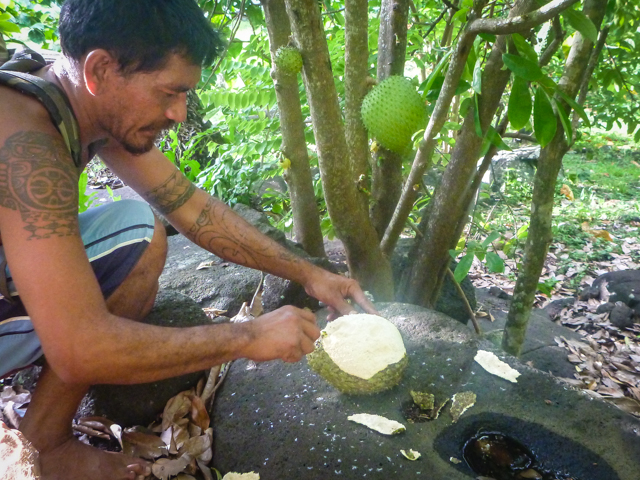
Q: What challenges have you had to overcome? Were you ever scared? How did you deal with those emotions? -Liam
M: There are always challenges out there. Heavy seas, unseen underwater shoals, sharks, boat malfunctions…. they all evoke fear. It can be scary being out on the water all alone and it’s important to handle those emotions carefully. You have to look at the situation logically, be able to take a step back and think things through. Are you really in danger, or just worried or frustrated? Most of the time when I’m scared, I’m really just hungry and tired.
I’ve found with fears, it’s really important to turn on the logical, thinking part of your brain and really be honest with yourself about what’s going on. So, I talk to myself- like in my head. What really am I afraid of? And, I’d list those things. And for each item, I’d tell myself why it wouldn’t likely happen, or if it did, what I would do. This really helps if a friend can also help talk you through it. It made me realize that most fears are completely illogical. It’s your imagination. When you find a realistic thing to be afraid of, then you ask yourself what steps you’d take if that does really occur. And you feel better.
And after all of that, sometimes you’re still a little scared or nervous. But that’s when you have to just be brave and go for it. Being on an expedition is often about facing your fears, but the best part is when you have faced your fears, come out just fine, and get to feel really good about yourself. That feeling is a very special one, only found after experiences like these.
So, it’s ok to be afraid. If you can reason why it’s a silly fear, then do so. That helps a great deal. But sometimes standing up in the face of your fear is required.
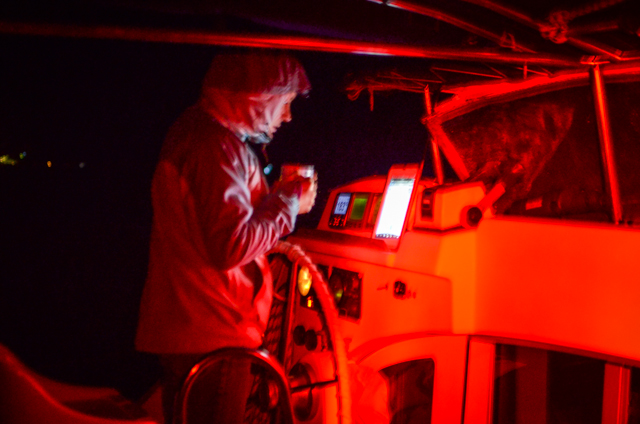
P: I agree, don’t give in to foolish fears; focus on real problems because you can solve almost all of them. One example: Some friend in Fiji told us about a partially submerged cave system on one of the islands that you have to hold your breath and swim underwater from one cave to the next with flashlights. It’s really intimidating, a gaping dark hole to nowhere. I had to step back and reason with myself. “There are no man-eating monsters in the cave. Only little blind eels that can’t see you anyway. The real problems here is remembering the way out of the caves.” It freed up my attention and gave me something to focus on. I look for landmarks in each cave to get back to the last one before moving on.
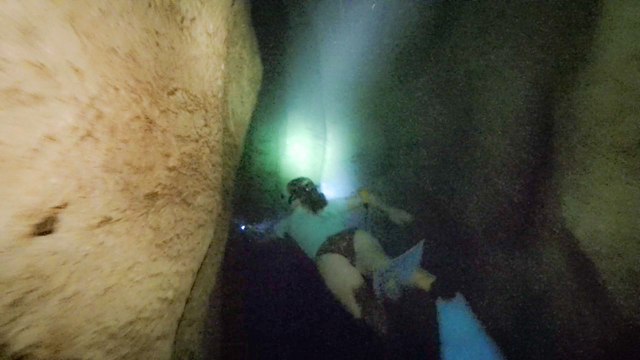
Q: You said that it’s a strange sensation to get off the boat onto dry land after some time at sea. How long does it take to get your ‘land legs’ back? -Mr. Overton
P: After a couple weeks at sea you get wobbly knees and ankles for an hour or two when you’re walking around a new town, checking in and the like. It goes away pretty quickly, but the atrophy of your leg muscles is scary after not walking more than thirty-eight feet in any one direction for a long time.
M: I was surprised when we took our classes in the Pacific in Chile and on the Great Lakes in Michigan when our bodies weren’t as used to the motion that after we got off the boat and were inside a building the walls seemed to sway. It was a pretty startling feeling. We don’t get that much anymore.
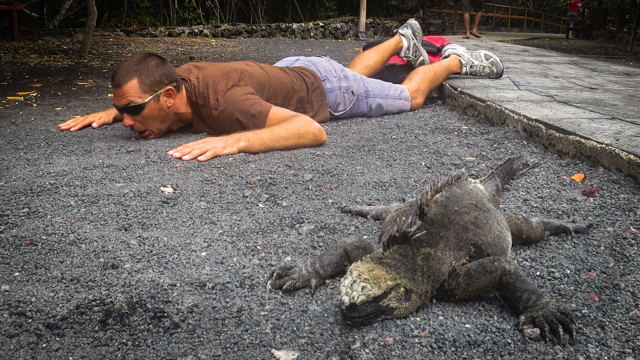
Q: What inspired you to take this trip? -Josh (from New Zealand! Woot!)
P: I’ve been working towards taking this trip since I was your age! I started out in a little town in Michigan going on small adventures, learning small but important lessons. I learned little by little how to keep comfortable in terrible weather, how to be self-sufficient, what risks are worth taking and which are too foolish to try, how to overcome fears, and how to get along with other people. I didn’t necessarily know when I was in fifth grade that sailing around the world was in my future, but I knew that exploration was always calling to me.
This wasn’t the perfect time in our life to set out on an adventure but there’s never a perfect time. We designed the trip not as a vacation, but as a learning adventure. Jets are much better form of transportation to see new place. This was about becoming a stronger, better person. We wanted to learn to sail way out in the middle of nowhere, out over the horizon, partially for the experience of it, but also to see what would blossom out of ourselves as a result.
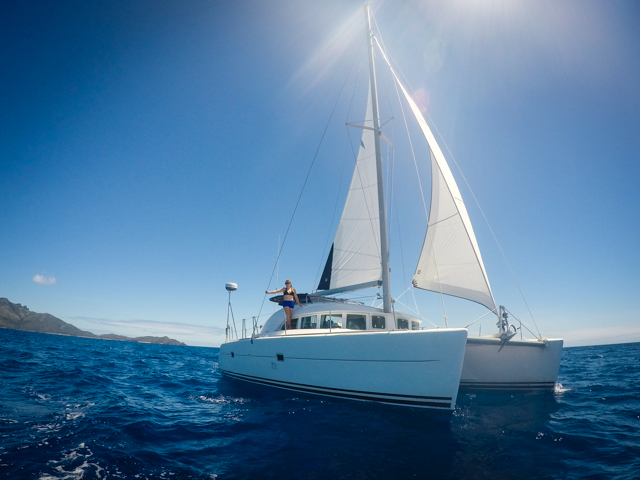
Q: What else would you want to say to young explorers? -Mr. Overton
P: For you young explorers, starting small is really important. Don’t jump straight into the water if you don’t know how to swim. But don’t be afraid to get your feet wet and ask someone to teach you how. Then practice in the pool with your big brother. Then practice in a lake with your dad. Then go out surfing with your buddies in La Serena.
Learn as much as you can. Ask sincere questions about everything. You’ll never know when something you’ve learned long ago comes back to save you. And the more you learn, the better you get at it. Every time you learn something new you’re practicing for your next adventure. Who knows, you might already be on it and not even know!
Almost everything in life can be an adventure. Sometimes you’re just exploring a new type of food! If you’re solving a problem or fixing something that doesn’t work, you’re definitely on an adventure! The more you realize that you’re an explorer already the more exciting life becomes. Get your Sir Edmund Hillary hat on and run with it!
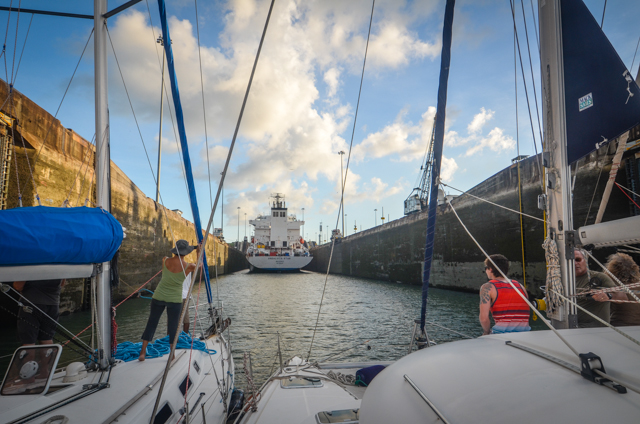
There were two other questions brainstormed by the students that Miranda and I didn’t get to in our conversation but though might benefit young explorers:
Q: What skills did you need to do this trip? What have you acquired along the way?
P: We have learned SO much on this trip. We started with the mechanics of sailing in a school with Mr. Casey! We took three sets of classes that helped us learn how to work an offshore boat safely, how to navigate when there’s no land in sight, how to forecast weather.
It’s so important to be a good learner. You don’t need to know everything or be the smartest person ever, but you need to know how to problem solve, learn new things, and be observant of your world.
For example, I didn’t know how to fix diesel engines before we left. But I did know how to learn on my own from books, other people I meet, and the internet when its available. Fifteen hundred miles out to sea, the distance from Santiago to Lima, the bilge pump kicks on. We have water coming in. Observation skills: How much water is it? Should we send a distress signal? No. It’s a manageable amount. Where’s it coming from? The engine compartment. Which engine part? Hmmm… I’m not sure what that is. Let’s see… looks like the raw water pump.
All those little things I learned along the way and never thought I’d use have shown up here too. My mom is a great seamstress and taught me to sew when I was about your age, which wasn’t the coolest thing for a guy to learn. Guess what came in handy when our sail ripped open in the Caribbean, two weeks away from civilization? Sewing skills!
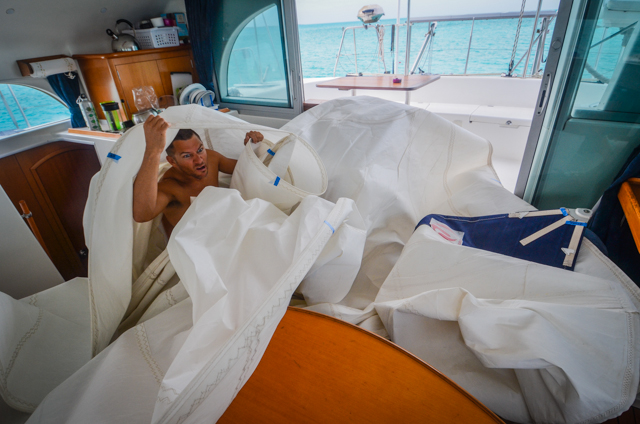
Q: What have you discovered along the way? Physically and/or personally?
M: I discovered that we’re all more capable than we think. We are stronger, tougher, smarter, and more talented than we give ourselves credit. Sometimes you just need a little push to see it come out.
It has become apparent that mental strength is much more important for an explorer than physical strength. Almost anyone can survive the trip; it’s not that hard. But it’s mentally and emotionally taxing at times and that’s when you can get into trouble if you’re not mentally tough.
We discovered that some of our biggest difficulties came from working with each other and not from trying to survive on the sea. Each person has different ideas, preferences, skills, and limits. Few of the explorers you’re studying were completely unaided. They went with the support of mountains of people, as are we. Being a good communicator and community member is important in collaborating with all those people to make the trip a success.
I also discovered that, like any good student, I wanted to have all the right answers right away. Not having all the right answers right away in the beginning was hard for me. When you do something difficult or just new, you have to be willing to fail a little. You’re not going to have all the answers in the beginning. You have to use trial and error. And when you error, which you will, you have to be able to get back at it, without just giving up and calling yourself a failure. And you have to be confident enough in yourself to know that you will learn along the way. You will figure it out. Even if you don’t know it all right now- eventually you will, and that’s ok.
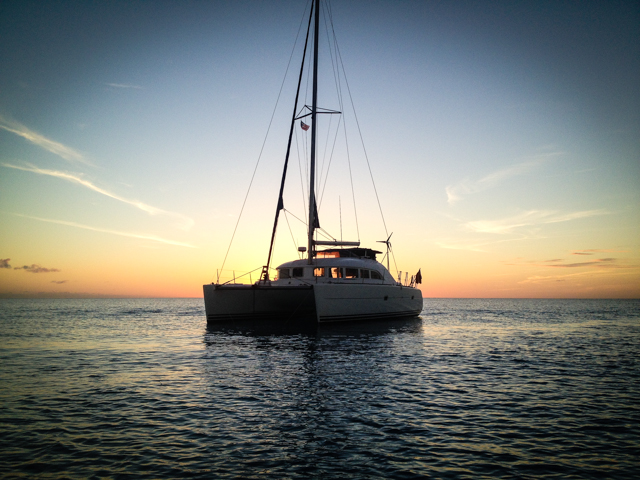
Many thanks to Mr. Overton and his fifth-grade class of explorers for your interest in the adventures aboard s/v Tayrona! We were so happy to share our stories with you and hope they galvanize you to get out there, get muddy, and explore your world. Good luck and be safe!
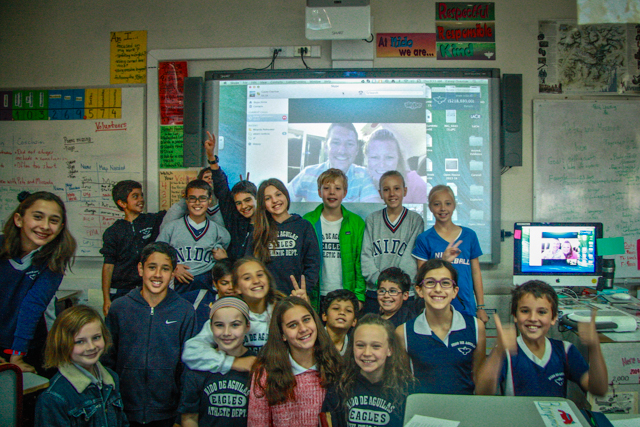


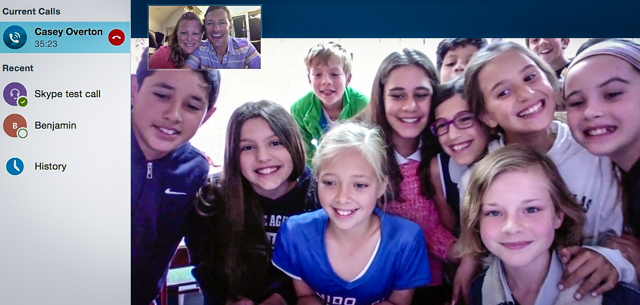
Hey, those were some thoughtful, spectacular answers. We read them to Reed and Raelin because your spirit of being risk-takers and message of perseverance, personal growth, And belief in yogur selvas camello through so Clearly And Is so important. Inspiring stuff…Well done. If you’re up to another Skype sometime, Reed Is doing an explorer unit.
Damn shame about the holodeck, but I loved the shout-out. Need the holodeck. I’ll get my people on it.
Finally, I’ll thank you kindly in advance to never mention the pitch black underwater cave explorations ever again. Just too terrifying…(and daft, by the way. Seriously…no more of that)